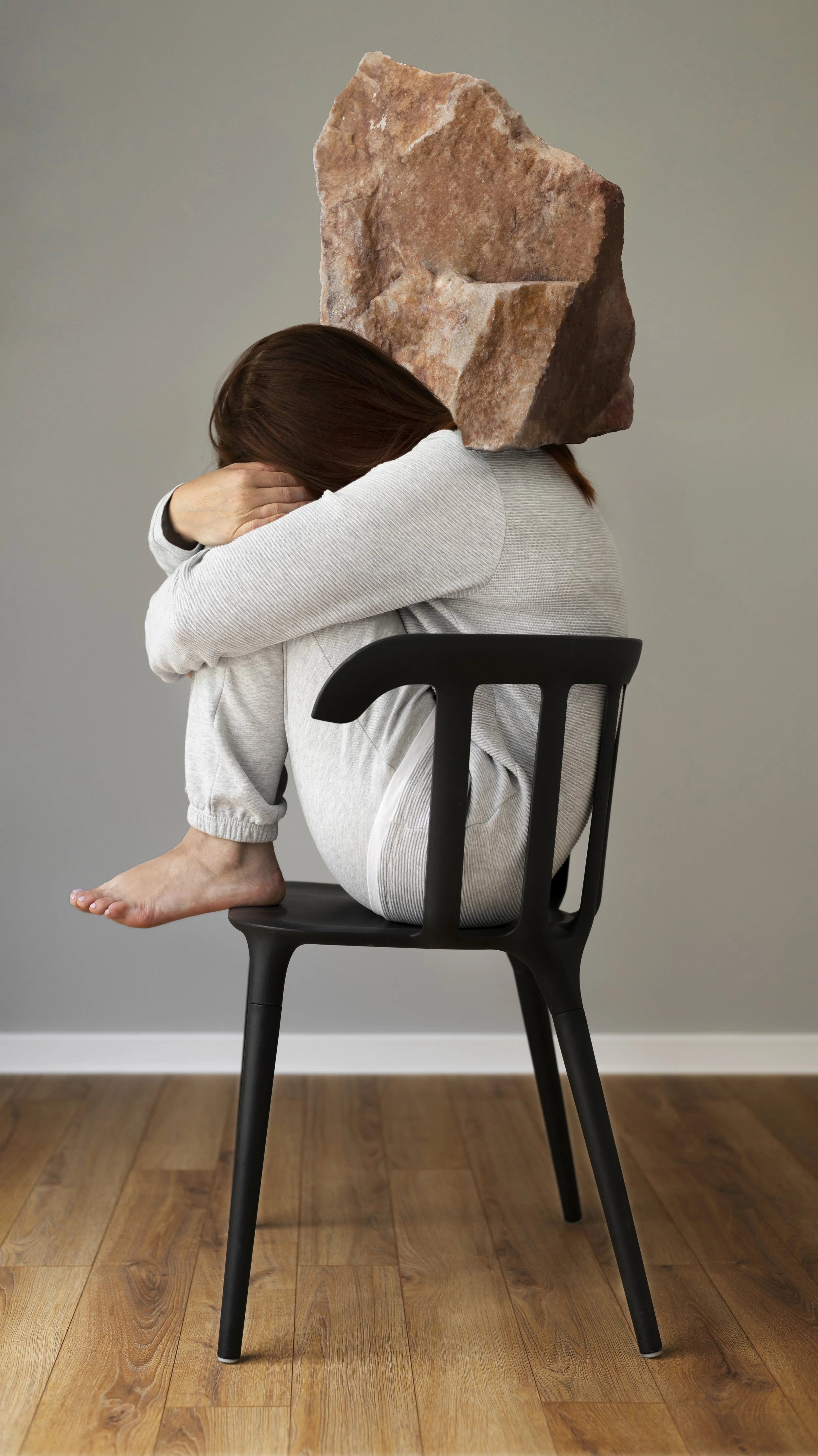The Mental Load of Yom Tov: What Orthodox Women Need to Talk About
As Orthodox women, we prepare for Yom Tov with love, kavanah, and a deep sense of responsibility. We cook. We clean. We shop, plan, coordinate, delegate, remind, remember, run, rush, and then try to breathe before candle-lighting.
We want the chagim to feel meaningful. Uplifting. Beautiful. And they often do.
But somewhere between dipping apples in honey and boiling toothbrushes before Pesach, a lot of us start to feel the same thing:
I’m doing everything. And I’m exhausted.
If you love Yom Tov but also feel overwhelmed by it…
If you pour your heart into every mitzvah, but sometimes feel like no one sees what it takes to get there…
If you’re trying to stay present, but your brain won’t stop spinning—
This post is for you.
Why This Conversation Feels So Personal
I’ve sat with many Orthodox women in therapy—wives, mothers, kallahs, daughters, grandmothers—who love the rhythm of the Jewish year and still feel like they’re drowning in it.
They cry as they talk about standing in the kitchen on Erev Yom Kippur with a pot of chicken soup boiling over, kids crying, challah dough rising, and a mind racing with every halakhic checklist.
They tell me about staying up late on Erev Pesach peeling vegetables for the seder meal, organizing the shabbos dinner that follows immediately after, and wondering when exactly they’re supposed to feel the “freedom” that we speak about in the Haggadah.
They speak about showing up for shul on Sukkos, smiling through the seudah, but quietly counting down the hours until they can finally sit down without needing to light a grill or prep kebabs.
I get it. I really do.
Because it’s not just about the cooking or cleaning. It’s about the mental load—the invisible list that never goes away. And many of these concerns go unspoken even in Orthodox marriage settings, where emotional labor is often quietly absorbed by women.
The Hidden Weight of Mental Load
Mental load isn’t just doing the things. It’s remembering all the things.
It’s not just making lunch—it’s remembering who doesn't eat meat, who has an allergy, who you already invited last year, and how many disposable containers you'll need.
It’s the mind that’s spinning while the hands are working. Did I do tevilah for the new dish set? Did I pick up enough wine for Yom Tov? Did I remember to put the toothbrushes in the kashered pile? Did I check with the Rav about that halakhic question that came up?
It’s remembering that your child needs a new suit, that you need to plan a Shabbos meal for 10, that the baby’s teething, and that you haven’t actually sat down to daven with focus since Adar.
Mental load is the layer behind the layer. And for many Orthodox women, it’s invisible and constant. This is especially true for those navigating Orthodox Jewish mental health challenges while trying to uphold every mitzvah with grace.
This Isn’t a Complaint. It’s a Wake-Up Call.
Let me be very clear: this isn’t about rejecting Torah life. I love the chagim. I love what they mean. I love that we build our homes around them.
But when simchas Yom Tov turns into stress-induced burnout… when the physical and emotional burden of preparation becomes so consuming that we barely feel anything at the table except exhaustion… something is off.
The Torah tells us, venishmartem me’od lenafshoseichem—you shall guard your souls. That includes our emotional wellness. That includes our mental clarity. That includes our right to feel joy—not just to create it for everyone else.
We are a nation of spiritual strength. But Yiddishkeit isn’t supposed to run on depletion. This is where support from an Orthodox Jewish therapist can be life-changing.
What Would It Look Like to Speak About It?
Imagine if, before Purim, we didn’t just talk about costumes and mishloach manos, but also about emotional overwhelm.
Imagine if, during the pre-Pesach cleaning frenzy, someone in your Mesivta WhatsApp group paused and said, “I’m really struggling with the pressure this year. Anyone else?”
Imagine if, before Shavuos, we prepared cheesecake and made space to check in with our own minds: Am I okay? Do I feel Hashem here, in this process?
It doesn’t take away from the mitzvos. It adds to them.
Because when women are emotionally present, when we’re supported, when we can ask for help and get it—we actually become more connected to the chag, to the mitzvos, to the meal, to the people at our table, and most importantly—to ourselves. Therapists who understand Orthodox Christian marriage and Orthodox Jewish marriage counseling can help create safe spaces to speak about these emotional loads within culturally competent frameworks.
Let’s Talk About the Mikvah, Too
It’s not always spoken about, but the cycle of the mikvah around Yomim Tovim can bring its own stress.
When you're scheduling tevilah around late nights, family guests, and halakhic timelines—it can turn something intimate and spiritual into yet another chore on the never-ending list.
Some women tell me they cry on the way to the mikvah during the chag. Not because of the tevilah itself, but because of everything around it—the timing, the pressure, the fatigue.
We need to stop pretending that Torah observance has to be carried with silence.
The mikvah is beautiful. It’s also sometimes hard. Both can be true.
But Isn’t This What Our Grandmothers Did?
Sort of.
Yes, they worked hard. Yes, they built families with limited resources and endless strength. But they also didn’t have language for mental health. They didn’t always have space to say, “I’m overwhelmed.” Talking about burnout wasn’t an option.
But that doesn’t mean we have to repeat their silence.
We are a generation with more awareness. More tools. More access to support. That’s not weakness—it’s siyata dishmaya.
You can love your Torah life and still say:
“I need help carrying it right now.”
That is avodas Hashem, too.
This is the message that Orthodox mental health professionals and Orthodox therapists are helping normalize for today’s generation.
What Can You Do to Lighten the Load?
A few small shifts can go a long way:
1. Write it all down.
Get the mental load out of your head and onto paper. Write out every meal, every guest, every errand, every halakhic question. Once it’s out of your mind, you can see it more clearly—and ask for help.
2. Don’t carry it alone.
Delegate. Involve your children. Let your husband take ownership of part of the planning. Let go of perfection. A slightly burnt kugel isn’t pikuach nefesh.
3. Give yourself permission to say no.
You don’t need to host every seudah. You don’t need to do every minhag if it’s beyond your capacity. Ask your Rav what’s required and what’s custom. Halakhah often gives us more room than we think.
4. Protect moments of quiet.
Even five minutes. Sit down with a cup of tea. Walk around the block. Breathe before lighting candles. Look up at the sky and remember Who runs the world.
5. Talk to someone.
You don’t have to wait for a crisis. Therapy is not a last resort. It's a tool to help you feel calm, present, and emotionally connected. There’s no shame in saying: “I need a space to think, to cry, to reset.”
To the Woman Who Feels Alone in All This
If you're reading this while folding laundry or standing over a bubbling pot, if your heart quietly whispered, “Yes, this is me”—please know:
You are not alone.
So many Orthodox women are carrying this same load. Some are quietly stressed. Some are deeply sad. Some feel resentment they’re afraid to speak aloud. Some are barely holding it together—and then show up to shul with hair done, dress ironed, and a smile pasted on.
Hashem sees your effort. Every meal, every moment of tefillah, every tired step you take to make Yom Tov meaningful—He sees it.
And He also wants your mind to be whole. Your heart to feel light. Your body to rest.
Whether you work with an Orthodox Christian therapist or an Orthodox Jewish therapist in your community, the goal is the same: feeling seen, heard, and supported.
You’re Allowed to Take Care of Yourself
Therapy isn’t just for after the chagim, when you’re burned out. It can be part of the process before, too.
It can be the place where you say: “I’m trying to live a Torah life, but it’s feeling heavy right now. Help me make sense of that.”
And that’s what we do. We sit together in a space without judgment or pressure. We talk about the parts you can’t say out loud at the seudah table. We talk about joy, sadness, stress, the Torah, the mitzvos—and how to live with them fully, not just for others, but for yourself too.
If You're Ready to Lighten the Load
I’m Lauren Hofstatter, BS, MS, LMHC, and I work with Orthodox women who are building meaningful lives while carrying very real responsibilities. Through Jewish therapy, we create space to process, heal, and grow without judgment.
If Yom Tov has left you feeling more drained than delighted, it’s okay to say that. And it’s okay to want something better.
You don’t have to carry the whole nation of Israel on your shoulders. You just have to take the next step. Let’s talk.
FAQs
What is the meaning of Yom Tov?
Yom Tov literally means “good day,” but in Torah life, it refers to the major Jewish chagim—like Pesach, Shavuos, and Sukkos. These days are infused with kedusha, and like Shabbos, involve halachic restrictions on work. However, there are specific leniencies for cooking, carrying, and other practical needs (within halacha), which allow us to honor the day while still taking care of our families.
What are Jewish women traditionally known for in Torah sources?
Jewish women are described as the foundation of the home—akeres habayis. Our strength, modesty, wisdom, and emotional depth have always been central to klal Yisrael’s continuity. From Sarah Imeinu to modern-day rebbetzins, Torah tradition sees women as spiritual leaders—often quietly, but powerfully guiding their families with inner strength and yiras Shamayim.
What does halacha say about how a husband should treat his wife?
A husband is obligated by halacha to honor and cherish his wife. This includes physical needs, emotional respect, and sensitivity to her well-being. The Gemara teaches, mekhabdan yoser mi’gufo—he must honor her even more than himself. Torah marriage isn’t about hierarchy—it’s about partnership, mutual care, and dignity.
What kinds of work are forbidden on Yom Tov?
Like Shabbos, Yom Tov prohibits melacha—certain creative forms of labor like writing, driving, using electronics, and many types of manual work. But Yom Tov also allows certain forms of food prep, carrying (under halachically appropriate conditions), and other practical needs so we can celebrate the day with oneg and connection—without ignoring the realities of running a home.
What’s the deeper meaning of “tov” in Torah?
Tov means more than just “good.” It refers to something in alignment with Hashem’s will—something whole, beneficial, and spiritually aligned. From Bereishis—when Hashem saw that creation was “tov”—to the mitzvos we perform with simcha, tov captures the idea of inner and outer goodness working together.
In the Torah, what does ‘tov’ teach us about how to live?
In its biblical context, tov is about moral clarity and spiritual beauty. It shows up in places where people act with integrity, kindness, and faith. It’s not just a feeling—it’s a state of being in harmony with the values Hashem gave us. When we bring tov into our homes, our choices, and our relationships—we bring more bracha into the world.


